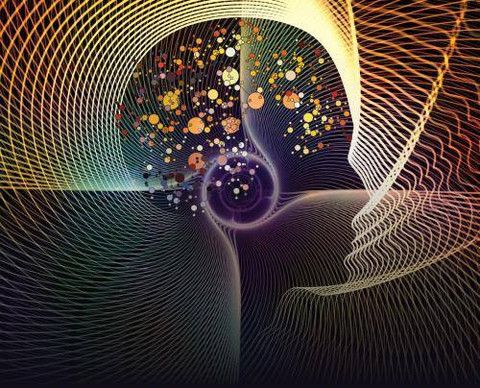God Concept
Your belief system creates a mental model of the world that forms the lens through which your life is viewed.

Forming a God Concept
Belief in god or religion creates a self-organizing psychological concept in the mind of the believer. Since god is the creator of all things, a part of all things, or even in control of everything in the universe, the believer is able to associate god with every aspect of their life. Their understanding of what god is colors their view of how every part of the universe works and why everything happens in their lives. It becomes a meme that connects to every part of the brain.
Benefits to the Believer

This confers many psychological benefits to the believer. Things that are painful or arbitrary can be justified as being part of "god's plan", helping to alleviate questions of "why?" that have no answer and can lead the mind into spirals of depression.
Seeing god as the ultimate source of goodness links the god concept to the brain's pleasure centers, releasing pleasurable neurotransmitters each time you think about god. And since god is part of everything, the adept believer can trigger that pleasure response in any situation, even the most dire.
The Form Matters Less Than The Function
But the important thing is to have a concept of universal goodness, not the particular cultural form it takes. Confusion over this fact leads to increasing strife in a global society where we are constantly confronted by dissimilar beliefs. And when science has become the primary source of truth, the traditional god concepts become harder and harder for each new generation to adopt.
The Fractal God Concept
metaculture uses the fractal organizational symmetry of the universe as a scientific metaphor for the god concept. The universe is self-organizing, it has self-similar patterns that repeat themselves from the subatomic level all the way to supergalaxies, it conforms to the rules of logic, it's infinitely complex but based on a few simple rules. Seeing the universe as one big fractal pattern helps make sense of the rational order of the scientific universe while imbuing it with the beauty and wonder that people have come to expect from their spirituality.
Hypertext representation of associating god/the universe with everything
Making Sure God is Good

While universality is universal, positivity requires mindfulness. The believer must tell themselves that god is good over and over like a mantra in order to reinforce the link between the universe and those happy brain chemicals.
This is built into many traditional rituals, prayers, and mediations. For example in Arabic culture, Allahu Akbar ("god is the greatest") is used throughout everyday conversation.
And help the poor souls who envision a wrathful god for their existence must truly be hell. Focusing only on the evils of the world and the pain that we naturally wish to avoid can turn the tables on god, triggering fear and anxiety everywhere. The devil isn’t the instrument of god’s vengeance, it’s the belief in a vengeful god.
By demonstrating the fact that one can turn their brain into an automatic generator of happiness (or fear) by adopting a god concept and associating it all the good things we seek in life (or evil to be avoided), the decision of which path to choose becomes obvious. Science says pick a happy god if you want to be a happy human.
The Evolving God Concept
As our knowledge of the universe advances through the ages, we are able to conceive of a god that is "more generalized" than the ones that came before it. This is similar to how our theories in science become more generally applicable. Newton explained large objects, Einstein generalized it to really fast ones, and quantum mechanics generalized it to tiny ones. Eventually a theory of everything will create a single framework for understanding all of these.
Knowledge of god proceeds the same way. We started with Animism where everything had its own individual spirit. Eventually these were formed into categories with Polytheism and finally generalized to a single god with Monotheism. The next step is to create a generalized theory of science and spirituality that resolves all of the monotheistic traditions as well as science into a single, Universalist, unified theory of everything. metaculture refers to this theory, whatever form it ends up taking.
Conclusion
Using the fractal god concept, metaculture creates a solid mental framework for understanding the universe and triggering universal positivity while eliminating the cognitive dissonance required to hold supernatural belief systems in an age of science, as well as the dissonance required to deny the inner truths of our traditions.
This hypothesis is being proposed based on conclusions drawn from a wide range of scientific and spiritual literature, rather than any specific established theory. It is definitely subject to confirmation through experiment. If for some reason future evidence disproves this, or provides a better framework for understanding the mental health effects of belief in god, then this page can be edited.
What if God Was One of Us?
As a pantheist, god is all of us, not just one of us.
Not sure why the thumbnails for these videos are so similar. Maybe it's a 90s thing.